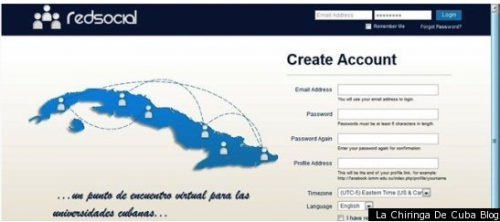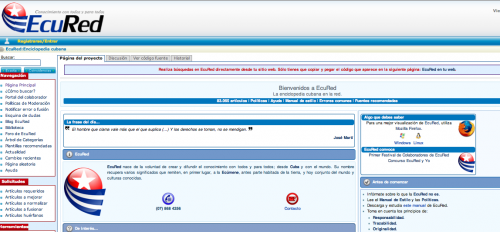(Cuban) Rage Against the Machines?
March 2, 2012 by admin
With the rise of social media and technology in our contemporary internationalized world, I wondered how a country like Cuba, where freedom of speech is often repressed, responds?
Cuba’s population of 11 million[1] faces limited Internet access, particularly with social media and networking sites. Private ownership of a WiFi network is difficult, if not impossible to obtain, albeit leaving Internet cafés and other collective areas approved by authorities amongst the only ways to access the Internet.
The cost of accessing the Internet for Cubans is roughly $1.50 per hour while the average monthly salary is only $20.[2] This cost is incredibly high when factoring in that this same salary must be used for other necessities. Presumably, Cuban authorities have elected to restrict Internet usage as a means of dampening political and economic activity between Cubans and the international community. Old forms of media are largely undemocratic; government forces are selective about how certain pictures and quotations could be used to create the frame they wanted. New media on the other hand, allows participants to decide how they want their expression to be portrayed in.
Though Internet users in Cuba already face strict Internet controls and limited access for financial reasons, Cuba’s nationalized network prevents unwanted information from foreign countries from entering their closed system. Recognizing the growth of social media sites and their impact on the international community, the Cuban Ministry of Education recently created “Red Social”[3], a near clone of the popular networking site Facebook, which only enables Cubans to communicate with other Cubans on the island and not with the rest of the world. This site comes nearly a year after the government’s creation of a “Cuban Wikipedia”, called EcuRed[4], aimed at providing a government approved online encyclopedia of all Cuban knowledge. With the types of websites prevalent in the Cuban community, technologically savvy youth, in particular university students, have a means of communicating with each other throughout the island at an unprecedented pace.
The Internet’s capabilities distribute information at a higher speed and at a lower cost than traditional means. Social media, particularly Facebook and Twitter, have the potential to foster grassroots activism and political inclusion. It links together those with similar political ideals and enables users to create a transnational communication network. Though EcuRed and RedSocial may only be Cuba inclusive, Cubans can utilize the Internet and other forms of new media to criticize life under the current government, garner widespread support, and organize information as a means to promote their collective aims. Furthermore, the internet in Cuba remains a contested space because its role in the revolution is uncertain-it provides a boundless universe of culture and knowledge, but can also be used as a weapon against the aims of socialism.
[1] World Bank. http://data.worldbank.org/country/cuba
[2] “Internet Enemies: Cuba”, Reporters Without Borders, March 2011
[3] Mairata, Sandro. “Castro’s Answer to Social Networks? A Cuban Facebook Clone – Univision News Tumblr.” Univision News. Univision, 1 Dec. 2011. Web. 01 Mar. 2012. <http://univisionnews.tumblr.com/post/13595739410/cuba-facebook-red-social>.
[4] “Cuba Launches Online Encyclopaedia Similar to Wikipedia.” BBC News. BBC, 14 Dec. 2010. Web. 02 Mar. 2012. <http://www.bbc.co.uk/news/world-latin-america-11989296>.
Leave a Reply
You must be logged in to post a comment.

